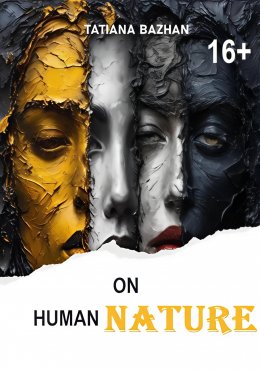On human nature

Story 1
Natalie was a wisp of sunshine personified. Her laughter, bright and tinkling, followed her like a happy little echo wherever she went. She approached the world with wide, curious eyes, eager to discover its secrets. A dew-kissed spiderweb transformed into a miniature diamond palace, a buzzing bee held the key to the flower’s sugary heart – every little thing held magic for Natalie.
She skipped more than she walked, her pigtails bouncing with each carefree step. Mud puddles were not obstacles, but delightful opportunities for a splash. Scraped knees were badges of honour, proving she’d been adventuring. Natalie didn’t worry about tomorrow; she lived fully in the vibrant, exciting now.
Her open heart was a welcome mat for anyone she met. A shy smile from a stranger, a lonely bird with a broken wing – Natalie offered kindness without hesitation. She saw the good in everything and everyone, radiating warmth that drew people to her every now and then. Her curiosity wasn’t just about knowing what, but understanding why, fostering an empathy that belied her young age. Natalie was a reminder that joy is a choice, and she chose it every single day.
Story 2
Beata had always felt like a mismatched sock in a drawer of perfectly paired sets. The relentless normalcy of her parents, their predictable routines and unwavering expectations, suffocated her.
So, Beata invented a sickness. It started as a vague fatigue, a persistent headache she’d whisper about. Then, there came dizziness. She researched obscure ailments, mimicking symptoms she found online. The more attention she received, the more elaborate her charade became. Doctors poked and prodded, running countless tests that revealed nothing. Yet, Beata insisted, her voice laced with a fragile conviction. She revelled in the hushed concern, the permission to withdraw from obligations, the escape from the life she didn’t want.
Her parents, initially worried, grew increasingly frustrated. They saw through her act, but their attempts to reason with her were met with theatrics and silent tears. Beata had built a castle of illness, a sanctuary from the ordinary. Inside, she was the tragic heroine, forever misunderstood, forever unwilling to embrace a life deemed acceptable by everyone but herself.
Story 3
Seamus stood before the flickering candlelight, the icon of Saint Brendan casting a warm glow that contrasted starkly with the chilling shadows of his past. His mother’s eyes, once filled with hope, now mirrored the relentless pain of disappointment. “You can’t keep running from this,” she had whispered, but the weight of her words faded like the Irish mist that enveloped their village.
With a heavy heart, he swore – through clenched teeth and trembling hands – that he would forsake the bottle that had stolen his dreams. Yet, in that moment of resolve, another voice beckoned him, one that promised a fleeting escape from the suffocating grip of reality. The allure of the nearby pub called like a siren to a weary sailor, each note harmonizing with the echoes of laughter and camaraderie.
In a heartbeat, Seamus felt the pull of nostalgia and regret intertwine, each step toward the pub whispering tales of his childhood ambitions. He could almost hear the roar of engines, feel the wind against his face as he was soaring through the skies, just like his father had. But instead, he surrendered to the familiar embrace of defeat, the taste of dreams lost drowning amidst a sea of whiskey.
Story 4
In the dim light of his cramped studio in London, a young artist named Elias sculpted his visions with passion. Each stroke of paint was born from the depths of his soul, capturing the beauty and anguish of life as he was staring into the abyss of starvation. The walls around him were adorned with canvases alive with emotion – golden sunsets drenched in sorrow and faces that were whispering secrets of forgotten dreams.
When his first painting sold, a rush of exhilaration flooded him, momentarily filling the void of hunger. The money was more than just currency; it transformed into lavish dinners and a warm bed. With each new success, however, the allure of comfort wrapped around him, like a silken shroud, stifling the rawness that had fueled his art.
As he indulged in the pleasures of newfound wealth – glittering soirées and sumptuous feasts – his brushes lay idle, collecting dust like forgotten dreams. The vibrant colours that once flowed from his heart dulled into paler hues, and the canvases began to languish, stale and uninspired. Elias watched helplessly as the radiant fire of his talent dimmed, forever longing for the days when hunger was his muse.
Story 5
Lark was born under the sky bruised with the promise of storms, a fitting omen for a life dedicated to weathering them for others. Even as a child, he possessed an uncanny awareness of injustice, a burning empathy that made him rush to the aid of stray animals and bullied classmates. He wasn’t the strongest, nor the fastest, but his fierce determination and unwavering belief in fairness often tipped the scales.
As he was growing older, this innate protectiveness solidified. He trained in various disciplines, not for aggression, but for defense. He saw the world as a place of vulnerability, and felt an almost physical pull towards the fraying edges.
Lark never sought recognition or reward. He was a quiet guardian, appearing in the shadows to offer a hand, a shield, or a voice to those who had none. Some called him a fool, others a saint, but Lark simply saw himself as an instrument, a conduit for compassion in a world that often seemed determined to extinguish it. He was a bulwark against the tide, forever standing between the vulnerable and the storm, a silent promise whispered on the wind.
Story 6
